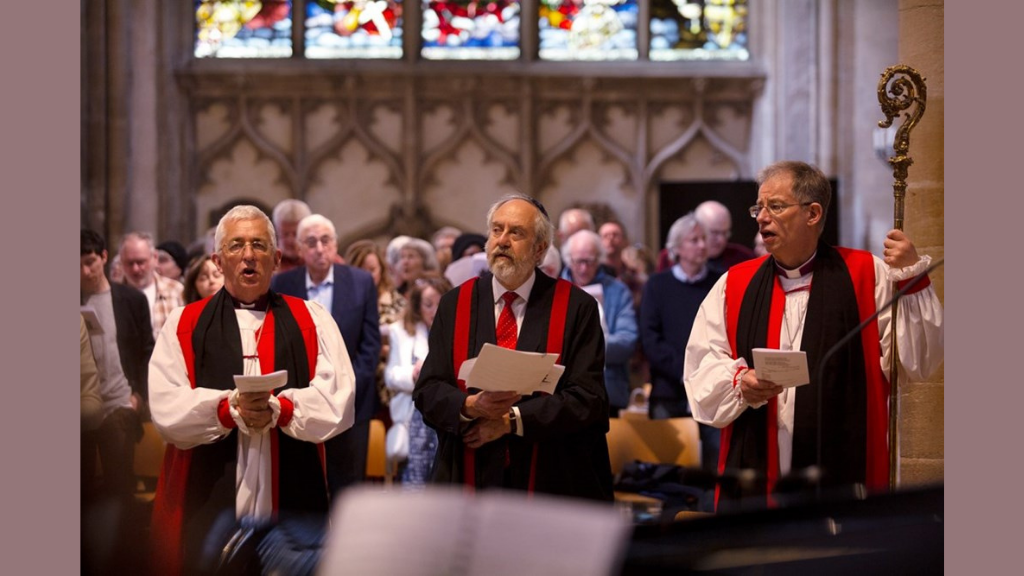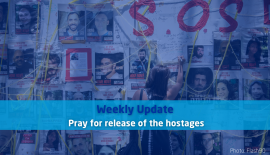Anglican Church Repents for its Role in Expulsion of Jews
On Sunday 8 May 2022, bishops of the Anglican and Catholic churches gathered in Oxford’s Christ Church Cathedral to ‘acknowledge with shame and penitence’ the antisemitism of the Synod of Oxford, 800 years ago.
Held in 1222, that Synod instigated a particularly disturbing time in Christian-Jewish relations in England, with repercussions across Europe. In promulgating the decrees of the Fourth Lateran Council (1215) the Synod added a range of further anti-Jewish measures for the English church. The resulting legal canons forbade social interactions between Jews and Christians, prohibited new synagogues, denied Jews access to churches, and required that they wear an identifying badge (which later developed into the Nazis’ yellow star). These prejudicial laws were followed by further anti-Jewish statutes, culminating in the mass expulsion of the Jewish community in 1290.
How was the English church moved to this act of repentance?
In 2019, the Anglican Church published its official document on Christian-Jewish relations, God’s Unfailing Word. At the end of its first chapter about the history of Christian antisemitism, it encourages Christian communities to take suitable opportunities to express repentance for this.
I had come across the 1222 Synod when publishing two booklets in 2017 about British Christian history and the Jewish people, and realised its 800th was approaching. A Jewish historian friend encouraged me to write a paper summarising what scholars have written about the Synod, and submit this to the Anglican Church to see if it truly meant what it had said about repentance.
I spent several months researching and writing the paper, finishing the footnotes after the first lockdown in 2020. Due to my role in leading Christians for Israel (UK), I had become a member of the Love Never Fails coalition of British pro-Jewish Christian ministries. They wanted to send a thank-you letter to the Archbishop of Canterbury for the 2019 document. I suggested adding a proposal about repenting for the 1222 Synod. This was agreed, and we sent it on 27 January 2021.
Then Jacob Vince (Director, Christian Friends of Israel UK) told us that because he is a lay member of the Anglican General Synod, he has a right to ask formal questions. Together we wrote two questions, which he submitted for General Synod in July. In replying, Bishop Michael Ipgrave (chair of the Council of Christians and Jews) finally confirmed that our proposal had been received, and that they would be “exploring the idea of such a service” of repentance. This vague answer was buried at the end of a long list of questions, and only published online. Even so, during the weekend, an eagle- eyed reporter with the Telegraph newspaper found this small paragraph and published a major article on the Sunday about the Anglican Church repenting to the Jews. This was picked up by many other papers in the next few days. We were delighted.
We then heard nothing for about six months; maybe they were hoping people would forget? Eventually Bishop Christopher Cocksworth (chair of the group who wrote the 2019 document) replied to me on 3 January, having been on sabbatical. He confirmed that plans were underway for a service in Oxford, organised by the Archdeacon of Oxford. After more emails, and much prayer by intercessors, it was decided that the service would be held in the cathedral, that it would be open to the public, and that it would be livestreamed also.
I circulated the information about ticket bookings around all the LNF ministries and many other pro-Jewish groups. On the day, the Bishop of Lichfield commented to friends that he was astonished to see the cathedral so full. Over 300 had travelled from every part of the UK, even some from Ireland and Switzerland!
The service featured moving contributions from the local Jewish community, and the Rt Revd Dr Michael Ipgrave reaffirmed a commitment to continue building these longstanding friendships:
“Remembering needs to lead to repenting… remembering with clarity what happened and its impact; repenting with sincerity for our turning away from the path of justice and mercy; and rebuilding in trustful partnership with one another. The last six decades have indeed begun to see a transformation in the ways in which our communities view one another, but there is still a long way to go… Trust can only be won through building friendship, through learning about one another, through treating one another with respect, through facing difficulties and disagreements openly, honestly and courteously.”
After the service, over 100 Christians gathered informally for prayer, while the official ‘civic reception’ was hosting the Chief Rabbi and about 60 other dignitaries. Finally, some 25 of us met in the gardens of Christ Church to pour salt from a new pottery jar into an underground stream there, which re-joins the River Thames to flow down to London. We proclaimed, like the prophet Elisha in 2 Kings 2:19-22,
“This is what the Lord says: I have healed these waters, they shall no longer cause death or animosity or barrenness.”
God accomplished every step of the process, in His mercy for our land.






